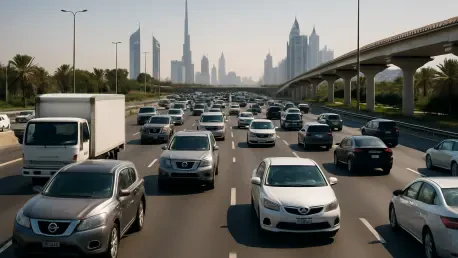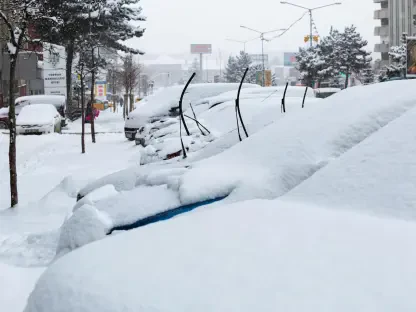In the bustling urban centers of the United Arab Emirates, where towering skyscrapers and endless streams of vehicles define daily life, university students face a hidden challenge that extends far beyond their academic workload. Traffic congestion, a pervasive issue in cities like Dubai, Abu Dhabi, and Sharjah, is not just a logistical hurdle but a significant threat to the mental health of countless undergraduates. Long, unpredictable commutes trap students in a cycle of stress and frustration, eroding their emotional well-being and hindering their ability to succeed in their studies. This growing crisis, often overshadowed by more visible academic pressures, demands urgent attention as it silently undermines the potential of the UAE’s future leaders. By delving into personal experiences, expert analyses, and potential solutions, the profound toll of traffic on students’ mental health becomes clear, revealing an issue that universities and policymakers can no longer afford to ignore.
Unveiling the Mental Health Struggle
The mental health landscape for university students in the UAE paints a troubling picture, with research from prominent institutions like UAE University and Gulf Medical University highlighting a widespread crisis. High rates of anxiety, stress, and depression plague undergraduates, creating a challenging backdrop to their academic journey. Traffic congestion emerges as a critical factor that intensifies these struggles, adding an insidious layer of strain. Studies reveal a stark contrast in stress levels between students with lengthy commutes—often exceeding an hour—and those with shorter travel times. The former group reports significantly higher incidences of severe stress, illustrating how the daily grind of navigating gridlocked roads exacerbates existing mental health challenges. This connection between prolonged travel and emotional distress underscores traffic as a silent but powerful contributor to a broader well-being crisis on UAE campuses, one that demands deeper exploration and intervention.
Beyond the statistics lies a deeper reality of how traffic shapes students’ daily lives and mental states in ways that are not immediately visible. The unpredictability of commute times creates a constant undercurrent of anxiety, as students worry about arriving late to lectures or exams. This chronic uncertainty disrupts their ability to plan effectively, leaving them feeling powerless over their schedules. Moreover, the physical exhaustion from sitting in traffic for extended periods drains energy that could be directed toward learning or personal growth. The mental toll is compounded by the frustration of facing delays day after day, fostering a sense of helplessness that erodes resilience. For many, the commute becomes a battleground where emotional resources are depleted before the academic day even begins, highlighting the urgent need to address this often-overlooked stressor in the context of student mental health.
Voices from the Road: Students’ Struggles
Across the emirates, personal accounts from students reveal the profound emotional and academic fallout caused by traffic congestion. In cities like Dubai and Sharjah, where roads are often clogged during peak hours, undergraduates describe a recurring nightmare of arriving late to class due to delays beyond their control. The consequences are far-reaching—missed instructions, attendance warnings, and even severe academic penalties such as failing crucial exams. The frustration of facing repercussions for circumstances they cannot influence leaves students feeling demotivated and disoriented. These stories paint a vivid picture of how a routine commute transforms into a source of deep emotional distress, stripping away confidence and replacing it with a lingering sense of defeat that impacts their overall university experience in significant ways.
The emotional burden of traffic does not end with academic setbacks; it seeps into students’ broader mental well-being, creating a ripple effect of negativity. Many describe the sinking feeling of watching the clock tick while stuck in gridlock, knowing that their punctuality and reputation are at stake. This constant pressure breeds anxiety that lingers long after the commute ends, affecting their ability to focus during lectures or engage with peers. The sense of injustice—being penalized for systemic issues like traffic—further fuels stress, as students grapple with a lack of agency over their circumstances. Over time, this repetitive cycle wears down their emotional resilience, turning what should be a manageable part of daily life into a formidable barrier to both mental stability and academic success, emphasizing the human cost of congestion.
Expert Perspectives on Traffic Stress
Mental health professionals and educators in the UAE shed light on why traffic congestion poses such a severe threat to students’ well-being, offering clinical insights into its far-reaching effects. Specialists note that prolonged commutes cultivate frustration and fatigue, which often manifest as irritability, disrupted sleep patterns, and a diminished capacity to concentrate in academic settings. For younger or less experienced drivers, the challenges are amplified—early wake-ups to beat rush hour disrupt rest, while navigating heavy traffic erodes confidence and heightens tension. The cumulative impact of these stressors can lead to chronic mental health issues, as the daily grind of commuting chips away at emotional reserves, leaving students vulnerable to deeper psychological challenges that hinder their personal and academic growth.
Further analysis from experts reveals that the time lost in traffic represents more than just a logistical inconvenience; it steals opportunities for meaningful engagement. Hours spent behind the wheel or waiting in gridlock are hours that could have been dedicated to studying, pursuing hobbies, or simply resting—activities essential for maintaining a balanced mental state. This loss of productive time intensifies feelings of stress, as students struggle to keep up with demanding schedules while battling exhaustion. Specialists also highlight that the repetitive nature of traffic stress creates a feedback loop, where initial frustration builds into long-term anxiety, further impairing academic performance. These insights underscore the urgent need for strategies that address not just the physical act of commuting, but also its profound psychological toll on the UAE’s university population.
Pathways to Relief: Addressing the Issue
Amid the mounting challenges posed by traffic congestion, students across the UAE are voicing practical ideas to alleviate the associated mental health burdens, calling for institutional empathy and flexibility. Suggestions include the adoption of flexible attendance policies that account for unavoidable delays, staggered class schedules to ease peak-hour gridlock, and modest grace periods for lateness to reduce punitive stress. Additionally, there is a strong plea for professors to show greater understanding of the external pressures students face, recognizing that tardiness often stems from systemic issues rather than personal irresponsibility. These student-driven proposals aim to create a more supportive academic environment, one that mitigates the emotional strain of commuting and fosters a healthier balance between responsibilities and well-being.
Experts complement these ideas with broader systemic recommendations, advocating for transformative changes to tackle the root causes of traffic-related stress. Expanding remote learning options emerges as a promising solution, allowing students to bypass commutes altogether on certain days while maintaining academic progress. Improvements to public transport infrastructure are also critical, as reliable and efficient systems could significantly reduce travel times and the associated stress. Additionally, universities are encouraged to collaborate with local authorities to explore campus-specific transport solutions, such as dedicated shuttles during peak hours. These combined efforts—blending immediate policy adjustments with long-term infrastructural advancements—offer a hopeful roadmap for reducing the mental health pressures on students, paving the way for a more resilient and supported academic community.
Building a Healthier Future for Students
Reflecting on the challenges faced, it becomes evident that traffic congestion has inflicted a heavy toll on UAE university students, weaving a complex web of stress, anxiety, and academic setbacks that linger in their daily lives. The personal struggles shared by students, coupled with the sobering insights from mental health experts, paint a clear picture of a crisis that demands attention. Moving forward, actionable steps emerge as essential—universities need to prioritize flexible policies and remote learning opportunities to ease immediate burdens. Simultaneously, investments in public transport and campus-specific solutions stand out as vital for long-term relief. By fostering collaboration between educational institutions, policymakers, and transport authorities, a framework can be established to safeguard students’ mental health against the relentless strain of traffic, ensuring that future generations navigate their academic journeys with greater ease and emotional stability.









